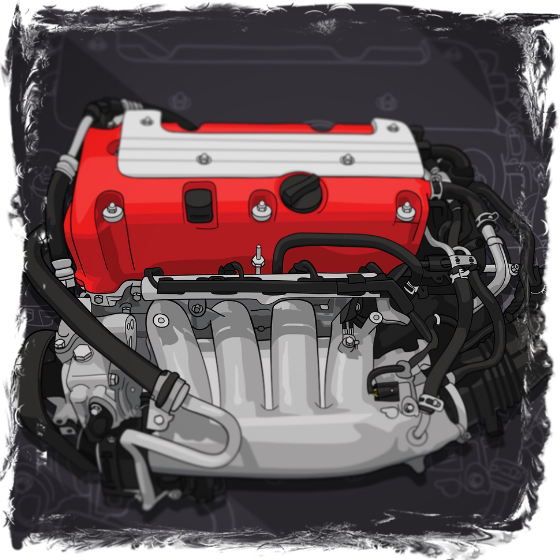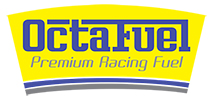Order Now!
OCTAFUEL
ACCELERATOR Race Fuel Concentrate
What does a fuel's octane rating mean?
Octane rating is the standard of measure of the performance fuel in an engine.
The octane number is an indicator of the fuel's tendency to burn in a controlled manner versus exploding in an uncontrolled manner. Fuels with a high octane rating and withstand higher compression before detonating or "knocking". Higher compression could be from high compression ratio of the piston / cylinder combination, the use of a super charger or turbo charger, or Nitrous oxide injection.
What is “detonation / knocking / pinging”?
Detonation, (also called knocking or pinging), is when the fuel in the cylinder fires before the completion of the compression stroke. When detonation occurs the flame front of the combustion is uneven across the piston. The net result is the piston will “rattle” from side to side in the cylinder creating the knocking or pinging sound.
There are several octane numbers for gasoline. What do they mean and which one should I care about?
There are 3 octane ratings commonly used in the world. Research Octane Number (RON),
Motor Octane Number (MON)
and Anti-Knock Index (AKI or (M+R)/2).
Let's look at each of these individually.
Research Octane Number (RON): RON is the "laboratory" measurement of octane. The octane number is determined by running the fuel in a CRF Test Engine and varying the compression of the engine until the fuel "detonates" or Knocks. The engine is not under "load" and as a result RON numbers generally run higher than the other octane numbers.
Motor Octane Number (MON) is measured using the same CRF engine test however the engine is placed under a "Load" of 900 RPM. This test is a better indication of octane because it better simulates the octane in a real world setting, i.e. under load. MON numbers run lower than RON numbers.
AKI or (R+M)/2 is the Anti-Knock Index. This number is the average of the MON and RON numbers. This number is the most important because it averages the octane under load and at idle. This is the number that you should care most about. When a car company or an engine builder specifies a fuel's octane number for an engine, AKI is the number they are referring to.
When someone refers to a "point of octane" what specifically do they mean?
The scale of octane is a point of confusion for even seasoned motor sports enthusiasts and is a very important issue when evaluating octane enhancement products. A point of octane is 1/10 of an octane number. For example if you increase the octane of 87 pump gas by 8 "points" you are increasing the octane to 87.8. Many consumers see products on the shelf that promise to raise the octane by "10 points" and think that it will raise the octane by 10 octane numbers. That is not the case. Other suppliers rely on this confusion to sell their products. Don't be fooled!
How is ACCELERATOR different than octane boost products?
First, octane boosters only add a few points of octane and cannot raise the octane of pump gas to that of racing fuel. What many people don't know is that a point of octane is 1/10 of an octane number. For example, if an octane booster says it raises octane by 9 points and it is blended with 87 octane fuel the final octane number will be 87.9 not 96.
Second, octane boosters will raise the octane they don't increase the chemical energy of pump gas. This is because they are not adding the high quality fuel aromatics that are used in ACCELERATOR. As a result your engine will not "ping" but it will not generate as much power as it would using ACCELERATOR.
I can't get high octane gas for my boat at the marina. Can I use ACCELERATOR in my boat?
Yes! ACCELERATOR will work in any engine that requires high quality, high octane fuel. ACCELERATOR can be used in:
Cars, Snowmobiles ,Motorcycles ,Boats ,Personal Water Craft, Go Karts
Why not just use aviation gas in my high performance engine?
There are two major factors that go into the formulation of aviation gasoline. First is altitude. Aviation gasoline is blended with specific hydrocarbons to target engine operation altitudes of 10,000 feet or more. Some of these hydrocarbons are detrimental to a high performance engine operating at much lower altitude and will degrade performance.
Secondly, aircraft engines don't run at high RPM loads under normal operation. An aircraft at cruise might be turning at 2,500 to 3,000 RPM, significantly lower than the 5,000 to 9,000 red line typically seen in an automobile engine. Aviation fuel is blended to balance performance and economy at these low engine loads and as a result will not be as effective at high engine load.
One other issue that should be considered with aviation fuel is the use of lead. Tetraethyl Lead is used in aviation gasoline to increase the octane, (even in so called "Low Lead" or LL fuels). Lead will damage O2 sensors and catalytic converters which can be expensive to replace.
Lastly, it is illegal to pump aviation fuel into anything that is not an Aircraft.
Why not use jet fuel in my car?
Jet fuel is more like diesel fuel than gasoline. It is designed to be burned in turbine engines at very high operating temperatures. Jet fuel would seriously damage your engine assuming that you could even get it to fire up in the first place!
I have heard that "ethanol" based fuels like E85 and E15 have very high octane ratings. Why not just use those fuels?
"Ethanol" based fuels do have a high octane they also have lower chemical energy than regular pump gas. As a result your engine must be tuned to accommodate the decrease in chemical energy by increasing fuel flow, either through changes to fuel injection or carburetor jet size. On average you will need 30% to 40% more fuel to equal the chemical energy of non-ethanol fuels.
In addition, ethanol based fuels can have negative effect on your fuel system and engine. Ethanol will degrade components in the fuel system like fuel pumps and seals. Ethanol will also promote corrosion in the fuel system and exhaust system.
Will ACCELERATOR harm my O2 sensors or catalytic converter?
No. ACCELERATOR does not contain lead or other additives that can harm O2 sensors or catalytic converters.
I noticed that my spark plugs have an orange dust on them after running ACCELERATOR in my tank. Are my plugs fouled or scorched?
No! The dust you are seeing is the bi-product of burning fuel with manganese. This dust does not affect plug or exhaust components in any way.
If you are old enough to remember burning leaded fuel, or look at the plugs from someone burning leaded racing fuel, you will see a greyish white dust on the plugs and exhaust pipes. This is the bi-product burning leaded fuels. This dust has no effect on plug performance and will not damage the engine either.
To insure that this dust doesn’t affect engine performance we have been burning fuel blended with ACCELERATOR in many cars for the last 3 years. We have added ACCELERATOR to every fill up in a Toyota, BMW, VW, Porsche and a Ford for 3 years with no negative effect on the plugs, catalytic converter or O2 sensors. In addition we have 3 race cars with an average of 140 race hours on them using ACCELERATOR and have seen no issues. Lastly Tesar Engineering ran 3 Mustangs in the 2,000 Carrera Pan Americano using Mexican pump gas blended with ACCELERATOR with no problems and great performance, (See the Testimonials page to read the full story).
If a little ACCELERATOR is good, wouldn't a lot be even better?
No! It is possible to "over octane" an engine. While the effects on the engine are less than "under octane", the engine will not perform as well as it would with the right octane fuel. We encourage our customers to talk with their engine builder or people with similar engine configuration to determine the "right octane" for your car.
The chart below represents a good estimate of octane requirements by compression ratio. It is not specific to your engine so you may want to blend your fuel to an octane number or two higher than what is listed below.
Compression Ratio Octane Number Requirement
5:1 72
6:1 81
7:1 87
8:1 92
9:1 96
10:1 100
11:1 104
12:1 108
It is important to note that the octane numbers above are the "Anti Knock Index" number or (R+M)/2.
Will ACCELERATOR benefit a stock / street car?
It depends on the car. High performance cars like a Corvette, Viper, Porsche or BMW and turbo charged cars like a WRX will see improved throttle response and power. Cars with carburetors can be tuned to run ACCELERATOR and will see more power, (changes will need to be made to the carburetor jets and the timing).
Regular cars like a Chrysler 200, a Ford Focus or a Toyota 4Runner will not see a great deal of improvement.
It is important to remember not to "over octane" your engine as this will cause a decrease in performance.
Motorsports Fuel and Equipment Inc.
No.59, Shahid Vahabi St.,
Shahid SeyedAli (Estakhr) Blvd.,


